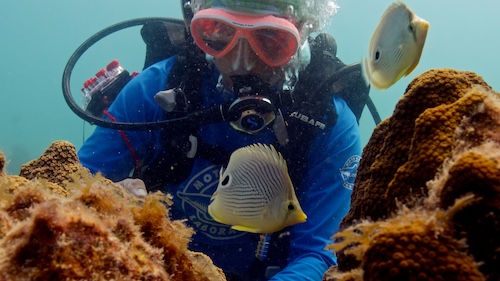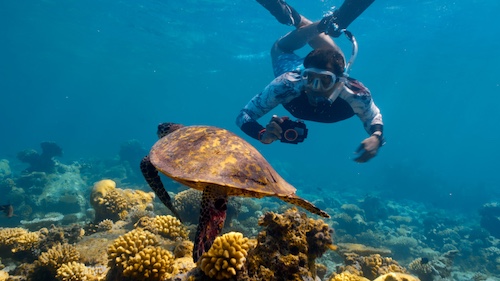Communiqué
Travel to the Maldives and the Florida Keys to investigate the urgent efforts to help the “Coral Reefs” on CHANGING PLANET – Starting April 24 at 8 pm
< < Back toCHANGING PLANET Returns to Explore the Amazing Global Innovations Being Implemented to Save Coral Reefs
Third Year of Seven-Year Project Premieres Wednesday,
April 24, 2024 on PBS and PBS.org
Global Conservation Scientist Dr. M. Sanjayan Travels to the Maldives and the Florida Keys to Investigate the Urgent Efforts to Help Coral Fight Climate Change
In the third year of the seven-year CHANGING PLANET project, renowned conservationist Dr. M. Sanjayan travels to the Maldives and the Florida Keys for an in-depth look at coral reefs — a habitat under urgent threat from climate change — and the innovative techniques that could save them. Featuring spectacular underwater cinematography, the program explores how scientists from across disciplines are collaborating on projects that offer glimmers of hope for the future of coral reefs. CHANGING PLANET: CORAL SPECIAL premieres Wednesday, April 24, 2024, 8:00-9:00 p.m. ET on PBS, PBS.org and the PBS App.

Credit: Duncan Brake/BBC Studios
Globally, coral reefs are at a crisis point; warming seas have caused corals to bleach and die at an alarming rate. Five hundred million people worldwide rely on reefs for food and to protect coastlines from storms and rising sea levels. But without action, scientists predict that nearly all reefs could die off in the next few decades.
In CHANGING PLANET: CORAL SPECIAL, Sanjayan visits Laamu Atoll in the Maldives to take part in a first-time collaboration that could be the key to restoring reefs. Professor Peter Harrison from Southern Cross University in Australia has devised a fertility treatment to help corals reproduce more successfully: “coral IVF.”
Corals spawn on just a few nights a year, releasing billions of eggs and sperm into the ocean. The resulting larvae settle on a reef and grow to become baby coral. But in the wild, spawn is at the mercy of currents and predators; only one in a million may survive to adulthood. Peter’s technique involves collecting spawn and maximizing fertilization, then allowing the larvae to develop in the safety of a net before releasing them onto areas of the reef that need restoration, significantly increasing their chance of survival.
Peter is now working with a scientist who hopes to enhance this process further. Professor Steve Simpson from Bristol University in the UK discovered that coral larvae move towards the sound of a healthy reef — and it is fish vocalizations, in particular, which trigger them to sink to the bottom, settle and grow. The scientists’ audacious plan is to combine Peter’s fertility technique with Steve’s fish recordings to lure them to set up home on a damaged reef. This method has never been tried before, but if it works, it could be a global game changer for reef restoration.

Credit: Mark Sharman/BBC Studios
In the U.S., Florida has the third largest barrier reef in the world, but it has lost an alarming 98% of its coral. Dr. Erinn Muller at Mote Marine Laboratory in Florida oversees a high-tech warehouse where thousands of coral fragments are carefully nurtured, a last-ditch attempt to prevent them from going extinct. As part of a $100 million reef restoration project, her team is breeding millions of coral to be planted back out on the reef, selecting ones that can best withstand warming oceans.
At the University of Miami, Professor Andrew Baker is creating a hybrid reef — a concrete structure seeded with coral larvae that will grow into a vibrant coral layer. These ready-made reefs could soon provide a home for wildlife and protect coastlines everywhere from extreme weather.
“The problems that coral reefs face can seem insurmountable, but around the globe, the scientific community is working together and working fast to come up with novel and surprising techniques to give coral a lifeline,” said Sanjayan. “These projects give me hope.”

